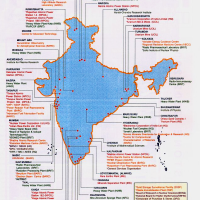
Bangalore – After visiting Abdul Nasser Maudany, a terror accused who has been lodged in a Bangalore jail for his alleged involvement in the 2008 Bangalore serial blasts case, a delegation consisting of Rajya Sabha MP, Senior Advocate of Supreme Court and several human rights activists on Saturday demanded that he should be granted bail on humanitarian grounds.
“It is very sad to see his health condition. He is suffering from many ailments. The Govt. and police are not ready to settle his case. They should stop dragging it any longer”, said Mohammed Adeeb, Member of Parliament in Rajya Sabha from Uttar Pradesh, while addressing reporters at a press conference here.
“If he is guilty, he should be punished. If he is not, then he should be released. This is not what a just society should be doing”, he added.
Describing the deteriorating heath of Maudany, Mohammed Adeeb also demanded that he be released on humanitarian grounds and that all terror related cases in India, including that of Maudany, should be transferred to fast-track courts and disposed off as quickly as possible.
“Even after 2 years, only 35 witnesses have been formally examined while more than 300 witnesses have to be examined. It will take years before the case is completed. The state has no proof against Maudany”, Mohammed Adeeb told Newzfirst.
Abdul Nasar Maudany was falsely accused for the 1998 Coimbatore serial bomb blasts that claimed 58 lives. Maudany was imprisoned for nine years as an under-trial. However, he was acquitted of all charges by the High Court in 2007.
Maudany charged that there was a hidden political agenda in connecting him with the Coimbatore blast case. On 17th August 2010, Maudany was arrested again for his alleged role in the Bangalore blasts of 2008 and is presently languishing in Parappana Agrahara Central Jail in Bangalore.
“What is sad to see is that after spending 9 years in jail in connection with the Coimbatore serial bomb blasts case and being honorably acquitted later, he was made accused in another blasts case”, said Colin Gonsalves, Senior Advocate of Supreme Court.
“He made a very sad gesture when we went to visit him. He pointed to his leg and said ‘When I touch my leg, it feels like rubber’”, Gonsalves said in a tone of sadness.
Gonsalves said that Maudany has virtually no power in one eye and has lost 80% eyesight in the other one. He also has gangrene that continues to spread throughout his body.
In May this year, Human Rights Activist and columnist NM Sidheeq, who visited Maudany in jail, had said that he is suffering from various ailments like diabetic retinopathy, diabetic neuropathy, cervical spondylitis, urinary block, disc collapse, stomach ulcer, back bone ache, blood pressure and many other diseases which he developed during the last two imprisonments as he was denied basic medical assistance.
A ray of light in the darkness
Abdul Nasser Maudany’s bail application was rejected repeatedly by the trial court, High Court and Supreme Court in the last 2 years. However, the SC judge had directed the state government to make available all medical facilities required for his treatment.
But because Maudany asked the court to grant his wife and son permission to stay along with him during treatment, the trial court has ever since delayed his treatment by denying this request.
“When the matter went to High Court, the judge asked us to file an affidavit and clearly specify as to which hospitals we would be taking him for treatment. We did so. The High Court then directed the state government to grant permission for the same”, said P. Usman, Advocate of Abdul Nasser Maudany, while speaking to Newzfirst.
“This happened 3 months back. But the trial court granted permission for this today. It is saddening, but at least some good news in so much pain”, he added.
Maudany has been granted permission by the 34th Additional Sessions Judge H. S. Sreenivas to get himself admitted and treated immediately in Soukhya Ayurvedic hospital and Agarwal eye clinic. The Court has further directed that he shall be entitled to have his wife Sufia and son Omar Mukhtar as his attendants.
Maudany and politics
Following the Babri Masjid demolition in 1992, Maudany had launched the Peoples Democratic Party (PDP) with the stated objective of “Muslim-Dalit-backward caste” alliance.
In 1992, Maudany also became the target of an assassination attempt, allegedly by a Rashtriya Swayamsevak Sangh (RSS) activist, in which he lost his right leg.
Related articles
- Karnataka High Court denies bail to Maudany again (thehindu.com)
- Kerala has limitations in Maudany case: Chandy (vancouverdesi.com)





 Aruna Shanbaug was left brain dead by the attack and remains in a vegetative state
Aruna Shanbaug was left brain dead by the attack and remains in a vegetative state Sonam, 14, (in orange) was raped and murdered in a police station
Sonam, 14, (in orange) was raped and murdered in a police station A rape is reported every 21 minutes in India
A rape is reported every 21 minutes in India











